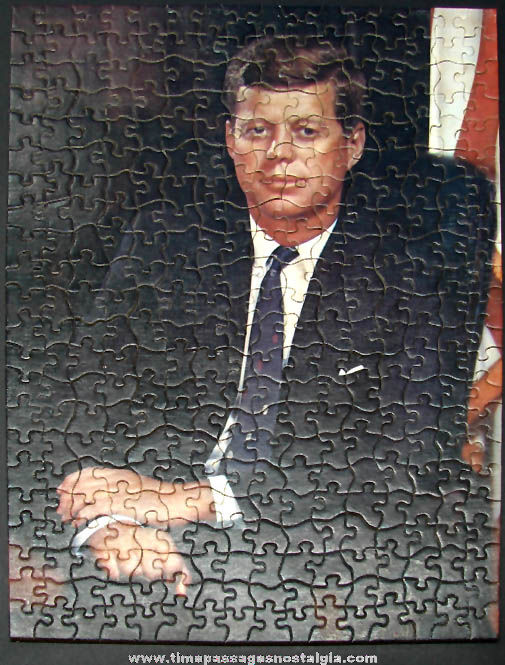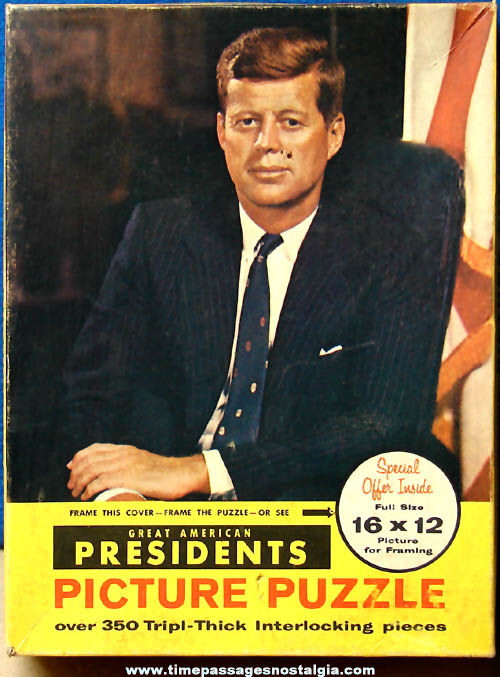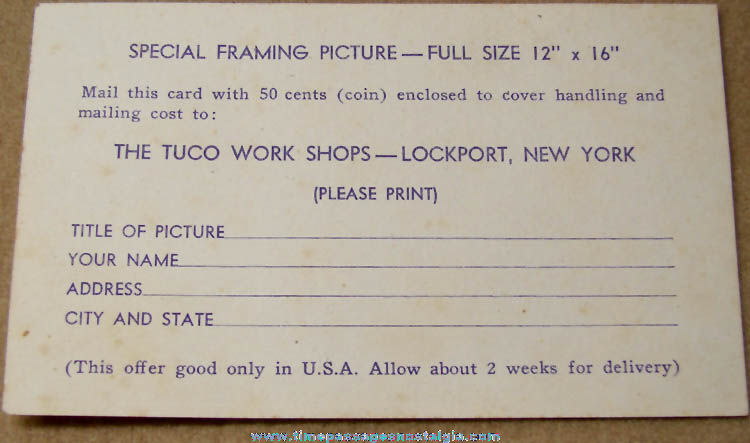
   | | | Any group of items being offered as a lot must be sold as a lot. | | Don't forget to
bookmark this site. | Whether you've collected Memorabilia for years or just want to feel like a kid again, please take a few moments to browse through what we
have available for sale. | | Fast Dependable Service | Great memories
make great gifts! | It's never too late to
have a happy childhood! | | Quality Merchandise At Reasonable Prices | Quality Packing And
Postal Insurance | | We have an extensive inventory that is not yet on our web site. If there is something you are looking for and did not find, please send us your wish list. |
| | | | The pictures show views of this Old Complete Great American Presidents John F. Kennedy Tuco Jigsaw Puzzle. Shown is the completed puzzle, the box, and the Special Offer card from inside. The puzzle is not dated but it is believed to be from the early 1960s. The puzzle and box feature an image of a Seated President John F. Kennedy. This puzzle was by The Tuco Work Shops of Lockport, New York. There is a card inside that you could have ordered a President Kennedy picture to frame. This puzzle has (352) triple thick interlocking pieces. We had missed measuring the puzzle when it was made, but the box measures 7-3/4'' x 10-1/2'' x 1-3/4''. The boxed puzzle appears to be in excellent condition as pictured. Below here, for reference, is some additional information about John F. Kennedy: John F. Kennedy
From Wikipedia, the free encyclopedia 35th President of the United States
In office: January 20, 1961 - November 22, 1963
Vice President: Lyndon B. Johnson
Preceded by: Dwight D. Eisenhower
Succeeded by: Lyndon B. Johnson
United States Senator from Massachusetts
In office: January 3, 1953 - December 22, 1960
Preceded by: Henry Cabot Lodge Jr.
Succeeded by: Benjamin A. Smith II
Member of the U.S. House of Representatives from Massachusetts’s 11th district
In office: January 3, 1947 – January 3, 1953
Preceded by: James Michael Curley
Succeeded by: Tip O’Neill
Personal details
Born: John Fitzgerald Kennedy on May 29, 1917 in Brookline, Massachusetts, United States
Died: November 22, 1963 (aged 46) in Dallas, Texas, United States
Cause of death: Assassination (gunshot wound to the head)
Resting place: Arlington National Cemetery
Political party: Democratic
Spouse: Jacqueline Bouvier (m. 1953)
Children: Arabella, Caroline, John Jr., Patrick
Parents: Joseph P. Kennedy Sr.& Rose Fitzgerald
Education: Harvard University (AB)
Military service
Allegiance: United States
Branch / Service: United States Navy
Years of service: 1941 - 1945
Rank: U.S. Navy O3 Lieutenant
Unit: Motor Torpedo Squadron 2, Patrol Torpedo Boat 109, Patrol Torpedo Boat 59
Battles / Wars: World War II, Solomon Islands campaign
Awards: Navy and Marine Corps Medal, Purple Heart, American Defense Service Medal,
American Campaign Medal, Asiatic-Pacific Campaign Medal (with 3 service stars), World War II Victory Medal John Fitzgerald Kennedy (May 29, 1917 - November 22, 1963), often referred to by his initials JFK, was an American politician who served as the 35th president of the United States from 1961 until his assassination in 1963. Kennedy served at the height of the Cold War, and the majority of his work as president concerned relations with the Soviet Union and Cuba. A Democrat, Kennedy represented Massachusetts in both houses of the U.S. Congress prior to becoming president. Kennedy was born into a wealthy, political family in Brookline, Massachusetts. He graduated from Harvard University in 1940, before joining the United States Naval Reserve the following year. During World War II, he commanded a series of PT boats in the Pacific theater and earned the Navy and Marine Corps Medal for his service. After a brief stint in journalism, Kennedy represented a working class Boston district in the U.S. House of Representatives from 1947 to 1953. He was subsequently elected to the U.S. Senate and served as the junior senator for Massachusetts from 1953 to 1960. While in the Senate, Kennedy published his book, Profiles in Courage, which won a Pulitzer Prize. In the 1960 presidential election, he narrowly defeated Republican opponent Richard Nixon, who was the incumbent vice president. Kennedy’s humor, charm, and youth in addition to his father’s money and contacts were great assets in the campaign. Kennedy’s campaign gained momentum after the first televised presidential debates in American history. Kennedy was the first Catholic elected president. Kennedy’s administration included high tensions with communist states in the Cold War. As a result, he increased the number of American military advisers in South Vietnam. The Strategic Hamlet Program began in Vietnam during his presidency. In April 1961, he authorized an attempt to overthrow the Cuban government of Fidel Castro in the failed Bay of Pigs Invasion. Kennedy authorized the Cuban Project in November 1961. He rejected Operation Northwoods (plans for false flag attacks to gain approval for a war against Cuba) in March 1962. However, his administration continued to plan for an invasion of Cuba in the summer of 1962. The following October, U.S. spy planes discovered Soviet missile bases had been deployed in Cuba; the resulting period of tensions, termed the Cuban Missile Crisis, nearly resulted in the breakout of a global thermonuclear conflict. He also signed the first nuclear weapons treaty in October 1963. Kennedy presided over the establishment of the Peace Corps, Alliance for Progress with Latin America, and the continuation of the Apollo space program with the goal of landing a man on the Moon. He also supported the civil rights movement, but was only somewhat successful in passing his New Frontier domestic policies. On November 22, 1963, he was assassinated in Dallas. Vice President Lyndon B. Johnson assumed the presidency upon Kennedy’s death. Marxist and former U.S. Marine Lee Harvey Oswald was arrested for the state crime, but he was shot and killed by Jack Ruby two days later. The FBI and the Warren Commission both concluded Oswald had acted alone in the assassination, but various groups contested the Warren Report and believed that Kennedy was the victim of a conspiracy. After Kennedy’s death, Congress enacted many of his proposals, including the Civil Rights Act and the Revenue Act of 1964. Despite his truncated presidency, Kennedy ranks highly in polls of U.S. presidents with historians and the general public. His personal life has also been the focus of considerable sustained interest following public revelations in the 1970s of his chronic health ailments and extramarital affairs. Kennedy was the last U.S. President to have been assassinated as well as the last U.S. president to die in office. |
|
Click on image to zoom.
   |